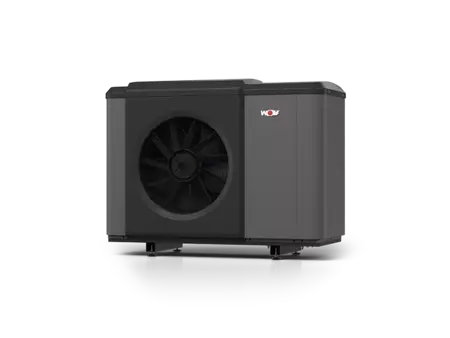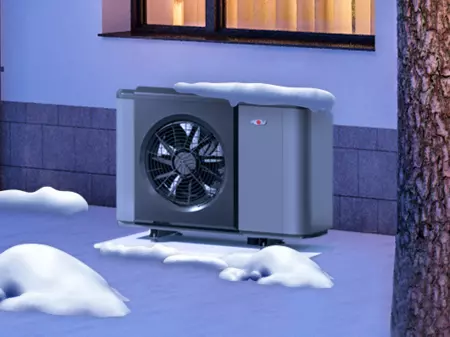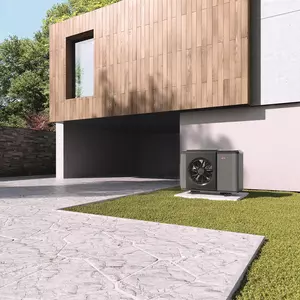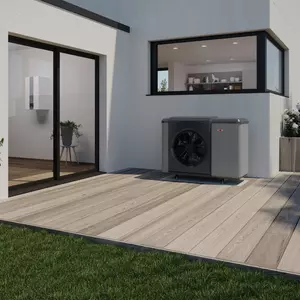
Find the right heat pump for your detached house
Thanks to consistent developments in environment friendly technology, manufacturers and contractors can offer homeowners a range of heat pump solutions for detached houses. Modern heat pumps are extremely efficient in both new and existing buildings. Read on to find out what you need to look for.
Which heat pump should you choose for a detached house?
The answer to this question depends on your individual requirements. Here are the main heat pump types which you might consider using in a detached house:
The air-to-water heat pump
Suitable for most detached houses
The most popular and cheapest heat pump solution for a detached house. The heat source for an air-to-water heat pump is the ambient air. It draws in outside air through a fan and feeds it to the heat exchanger in order to make the thermal energy usable for the heating system.
Efficient monoblock units are flexible and cheap to install. They provide the energy needed for central heating and DHW heating in detached houses all year round. Split units with separate components (one indoors and one outdoors) are another alternative. Air-to-water heat pumps are also far cheaper than other types of heat pump.
Air-to-water heat pumps
CHA-MONOBLOCK
The CHA Monoblock air source heat pump from WOLF is one of the most efficient air source heat pumps on the market. It is low-maintenance, made in Germany and comes with a five-year warranty. It also has a stylish design.

Benefits and drawbacks of air-to-water heat pumps
Geothermal heat pump
For detached homes with a larger footprint
Brine-to-water heat pumps use heat from the ground and are also known as geothermal heat pumps. This involves placing collectors in the ground. Since the temperature in the ground remains stable throughout the year at a certain depth, geothermal heat pumps provide reliable and consistent heat for your detached house.
However, these heat pumps often requires time-consuming and expensive drilling work, most of which requires a permit. These can make adding heat pumps of this type more of a challenge in existing buildings. This is especially true when using flat-plate collectors. These can be installed close to the surface but require a large amount of land.
Benefits and drawbacks of a brine-to-water heat pump
The water-to-water heat pump
Can also be implemented in detached houses with limited space
Water-to-water heat pumps also use the consistent temperatures of your heat source to heat the detached house. Unlike a geothermal heat pump, however, it uses the thermal energy of groundwater. This requires drilling two wells - one to draw in groundwater and one to return it after the heat has been transferred. Because of this, you will need enough space for these wells on your property. You will also need a permit for construction in most cases.
Benefits and drawbacks of a water-to-water heat pump
Efficiency criteria for heat pumps in a detached house
The German Federal Environmental Agency (“UBA”) recommends using the following criteria for even greater efficiency when using heat pumps in detached houses:
- High coefficient of performance (COP) and seasonal performance factor of heat pump
- Low flow temperatures (the heat pump still works efficiently at a flow temperature of 55°C)
- Temperatures of the heat source extremely consistent
- Harmonisation of individual components
The coefficient of performance (COP) of the heat pump can be used to compare different devices. The less electricity you need to generate heat for your heating, the better.
The heat pump works most efficiently in detached houses in conjunction with a surface heating system (for example, underfloor heating), as this only needs a low flow temperature. However, efficient heat pump designs are now also available for use in combination with traditional radiators.
Hybrid heating systems (i.e. heat pumps combined with another heating system with renewable energies or a combination of a heat pump with traditional oil or gas heating) can be used, but are usually not necessary. The heat pump covers the energy requirement and works reliably all year round. This removes the need for an additional heating system in a detached house. This is especially true for refurbished houses or energy-efficient new buildings. Fossil fuel-based heating systems can be used as a backup in old and inefficient buildings, but this is fairly rare.

Top advice from WOLF
If you are looking for an efficient heat pump for your existing building or a new build, you should seek in-depth advice. Correct dimensioning and careful planning are crucial for efficient heating. The experts at WOLF will be happy to help you.
A heat pump heats your home economically without impacting the environment
Future-proof and climate-friendly heating is easy to achieve by using a heat pump in a detached house - both in new and existing buildings. An air-to-water heat pump is particularly cost-effective and easy to install. You should always find the right heating system for your detached house to make sure that it is efficient. This will involve comparing the output rating of different systems. A heating output of about 4 to 5 kW is usually sufficient for a building covering 100 square meters. Only very large houses with poor insulation need more power.





